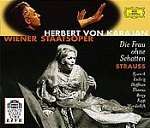|
Back
07/15/2008
Richard Strauss: Die Frau ohne Schatten, Op. 65
Jess Thomas (Emperor), Leonie Rysanek (Empress), Grace Hoffman (Nurse), Walter Kreppel (Messenger), Lucia Popp (Falcon, Guardian of the Temple, Slave Girl, Unborn Child), Fritz Wunderlich (Apparition of a Young Man), Margarita Lilowa (Voice from Above, Solo Voice), Walter Berry (Barak, the Dyer), Christa Ludwig (Dyer's Wife), Siegfried Rudolf Frese (One-Eyed Brother), Ludwig Welter (One-Armed Brother), Erich Majkut (Hunchback Brother), Olivera Miljakovic (Unborn Child, Solo Voice), Laurence Dutoit (Unborn Child, Servant, Solo Voice), Judith Hellwig (Unborn Child), Margareta Jsöstedt (Unborn Child, Solo Voice), Liselotte Maikl (Solo Voice), Orchestra and Chorus of the Vienna State Opera, Herbert von Karajan (conductor)
Live Recording, Vienna (June 11, 1964) – 171'
Three Discs Deutsche Grammophon Ref. # 457-678-2 – Booklet in German, English, and French (essays) with libretto (German)

This 1964 Vienna State opera performance will be familiar to Strauss mavens, having already appeared on disc in several incarnations. It is an important recording (though perhaps not the most desirable performance of the opera), as it not only represents the conductor's swan song at that house as Music Director, but also reminds us how far we have come in terms of Strauss performance in the interim. Now over forty years hence, one forgets that Frosch was still considered something of a rarity at the time - and evaluation of this recorded document is perhaps best formed within that contextual awareness.
It must be acknowledged that reactions to this performance will vary greatly regarding its leadership - there is nobody like Karajan to start a fight among opera lovers. The Maestro's vision is often simply glorious, the mystical aura of the work emerging as it rarely has under any other conductor. On the other hand, one can be forgiven for noting that Karajan might have been more considerate of his singers in an interlude or two and, more importantly, many will be taken aback at the extent of his cuts. The work is rarely given complete, but we here lose a disturbing amount of music, and there is a rather startling re-ordering of scenes in the second act. But it is definitely never boring.
The cast could hardly be bettered, then or now - indeed one wonders if Strauss himself ever heard such an ensemble in this music. One only need look at the supporting players (Fritz Wunderlich, whose beautiful tone aurally embodies the Vision of a Young Man's physical allure perfectly; or Lucia Popp as the Falcon and assorted other small bits to know that this is festival casting of a rare vintage.
Much has been made of the generally peerless Leonie Rysanek's intonation gaffes in this particular performance - rather overmuch it would appear, upon hearing it again. Act Three has some uncomfortable passages, and she does not exactly nail the birdsong of her initial entrance (in fairness, few do). But there are some glorious stretches of singing here, and the performance, despite its flaws, ultimately re-confirms the reasons for her long supremacy in this role. Jess Thomas is in excellent shape as the Emperor, though with Karajan's trimming he has lost a fair amount of his great aria. His timbre is not always the most seductive, nor does he field much dynamic variety, but his clarion tone and commitment count for much.
Then there is the Dyer and his Wife. Berry and Ludwig are fabulous here. Berry conveys a heartbreaking warmth and humanity, and his straightforward emotionality is most welcome. Ludwig is simply radiant. Some may prefer a more authentic dramatic soprano sound, but Ludwig mines such timbral gold here one feels the role could be written for her, and she perfectly balances the shrewish elements of the character with an aching vulnerability.
Grace Hoffman is an excellent Nurse, malevolent and working within a strict musical discipline.
The sound quality is often muffled, even when one adjusts expectations for live performance. But at times the technical fog lifts just enough for one to glean what was an amazing orchestral performance.
The booklet contains a German libretto and two helpful essays by Gottfried Kraus and Karl Löbl, in three languages.
Frosch lovers will definitely want this recording; the set preserves an often magnificent reading of the score, the cast is awe-inspiring, and its archival value is unquestionable. That said, one might want to seek out the legendary outing under Karl Bohm from the Met, which employed the same set of principles (excepting James King in for Thomas), and draw one's own conclusions as to how the work should go.
Mark Thomas Ketterson
|